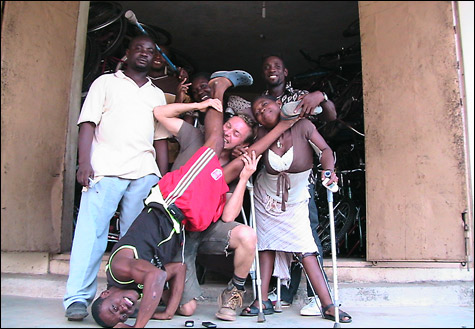
FULL CYCLE: David Branigan (center) of Bikes Not Bombs spent the past year in Ghana, training disabled locals in bike mechanics and setting up a now-thriving business.
|
David Branigan, who recently returned to town after more than a year in Koforidua, in Eastern Ghana, says what he missed most about Boston is the "efficiency." That might come as a shocker for those of us here who have ever waited for the Number 66 bus in the thick of winter.
Branigan arrived in Koforidua in May 2008 as a representative of local nonprofit Bikes Not Bombs (BNB), which had partnered with the Ghanaian-based Emmanuel Educational Foundation and Sports Academy for the Physically Challenged (EEFSA) on a project that would provide training in bike mechanics and business administration to disabled Ghanaians. (See "Empowerment on Two Wheels," November 7, 2008.) BNB has sent more than 37,000 bikes to the poorest spots on Earth, and almost 9000 of those have been sent to Ghana.
During those first few months in the West African nation, Branigan was awestruck by the chaotic roads there. "The flow of traffic is different," remembers the Pennsylvania native. "It's not very controlled, and so cars will turn without signals. . . . There are sometimes enormous potholes and four-foot gutters on the side of the road." (Actually, that sounds kind of like Boston.)
Branigan, who recruited and trained two salespeople and four mechanics, says he grew close with one of his new colleagues — Adjen, the only one of the bunch who could actually ride a bike. "After work, we'd always ride home together," he recalls. "And it was just so beautiful at dusk riding through the streets with Adjen, who's just this race devil. He's got this one strong leg and the other one is really thin, and he just races, man."
Each of the workers at Ability Bikes (as it was officially named) brought their own experiences and desires to the project. This occasionally resulted in tension between the mechanics — the confident, reliable craftsman and farmer Julius and the fiery social-justice advocate Sule, in particular. And then there was the issue of Miriam, the lone female mechanic. In the workshop, the males often took over, even though she'd eventually learn to build bikes better and faster than them.
Despite this sporadic strain, Ability Bikes gradually developed into a strong business. And on August 18, the shop's training wheels came off. That was the day Branigan left Ghana to take a post as BNB's international-programs director, a position that will enable him to further collaborate with Ability Bikes in the future.
That's not to say he won't miss his Ghanaian life, and the bike shop he and his new friends built from scratch.
"I'll miss every moment that I'd see things going really well at the shop," notes Branigan. "Every moment that I'd see Miriam building a wheel, then checking the wheel and seeing it's awesome, it's perfect. That feels so good."